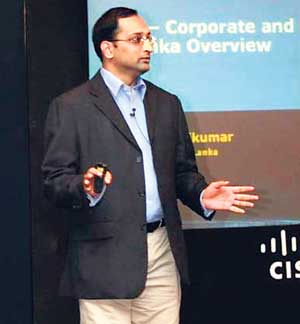
Cisco- weaving a 35 billion dollar web
Welcome to the human network. The tag-line of networking giants Cisco Systems Management B.V defines the hot trend of integrating communications across borders and portals. “The world has become absolutely flat, now it’s all about productivity,” said Rajkumar Natarajan Country Head of Cisco Sri Lanka, speaking at a media presentation held at Ahungalla recently. Worth US$ 34.9 billion globally as accounted for Fiscal Year 2006/2007, the Sri Lanka branch came into being in 2002, and now supplies networking solutions to a number of larger organizations as well as a considerable number SMB’s. Cisco introduced the first multi-protocol router and has since then been specializing in routers, switches, Multi-protocol Label Switching (MPLS) and many other networking solutions currently. The future is all about customer-centricity. “The content online is now being supplied by the customers,” Natarajan said, using hugely popular online video downloading site YouTube as an example. The videos on the site are uploaded by the online users, and 120 million videos are downloaded everyday. With customers taking such an active part, networking firms like Cisco, will go from being suppliers of solutions to the “platform” from which the customer can deploy his ideas. The technology Video conferencing is one of the key components in cross-border business dealings. Cisco’s ‘Telepresence’ takes it one step further, allowing international board room conferences the feeling of all members being physically present. The Telepresence facility comes in various dimensions; the most advanced being a three-screen ensemble which can be used across four countries. Technical consultant Lalith Silva introduced the IP (Internet Protocol) phone that enables enhanced connectivity between a head office and its island-wide branches through a router and switchboard. Newer versions of the IP phone have an additional video facility that enables the contacts to view live images of each other while conversing. “Unified communications” have become the buzz-words in the industry. The technology entails putting all the present types of communication on one IP device-voice, text, and image. In the words of Ranajoy Punja, Vice President-Advanced Technologies, India and the SAARC, “We have seen the tip of the iceberg, there’s a lot more to come”. Wireless technology and security are some of the biggest segments in the IT sector today. “Security threats have become more significant over the years, and our approach has to be proactive and not reactive”, he said. NCA Lokesh Mehra, Regional Manager-Corporate Responsibility, South Asia referred to the 356,500 shortfall of IT graduates in Sri Lanka as a “talent crunch” that is being urgently dealt with by the Cisco Networking Academy. The academy prepares the curriculum, has a web-based learning portal and also depends heavily on self-study. The certifications are recognised globally. Courses on offer cover designations ranging from the Network Administrator to the highly specialized Network Security Analyst. Sagarika Wickremasinghe is a testimonial to the value of the training offered by Cisco. “Our people can live without water but not without the Internet,” said she, describing the situation of her workplace, the University of Moratuwa, in the event of the Internet being “down”, an all too familiar scenes in most offices. She says that the inevitable loss of productivity could be saved if the workers themselves knew to deal with the problem, as she now does. Channeling the technology 84% of Cisco’s product deployment is done through its channels or partners. Some of the major partners in Sri Lanka include Dialog Telekom, Sri Lanka Telecom, HNB and the likes. Partners are divided into retailers, Small and Medium Businesses (SMB) and Premier, Silver and Gold Partners. In Sri Lanka, IBM is the only Gold partner. “Most often than not, we depend on our partners for implementation, because we trust them to know the lay of land,” said G.B. Kumar Senior Vice President, Customer Advocacy. The benefits for the customers can be explained through the story of the China Development Bank, one of the largest banks of the nation. The bank took on Cisco with a US$300,000 order for Advisory level work regarding security architecture for its extensive network of branches that stretches over all of China. Over a period of 18 months, the bank gradually handed over the designing as well as the implementation to Cisco, resulting in the value of the transaction rising to US$10 million Representing the partners, Priyanka Undugoda Head of IP and Broadband from SLT PLC was present at the event. SLT’s latest venture with the aid of Cisco is the IPTV or “TV on demand”, a hitherto unseen technology which allows subscribers to watch the programmes they wish at whichever time they want. The venture which is currently under experimentation is set to be released on trial to customers very soon.Ironically, for a country with Internet penetration of only 2%, Sri Lanka has a high level of technology adoption. Mobile density too is higher than most countries in the region. Cisco officials express their belief in the island’s potential being promising. |
|
||||||
|
||||||
| || Front
Page | News
| Editorial
| Columns
| Sports
| Plus
| Financial
Times | International
| Mirror
| TV
Times | Funday Times || |
| |
Reproduction of articles permitted when used without any alterations to contents and a link to the source page.
|
© Copyright
2008 | Wijeya
Newspapers Ltd.Colombo. Sri Lanka. All Rights Reserved. |
